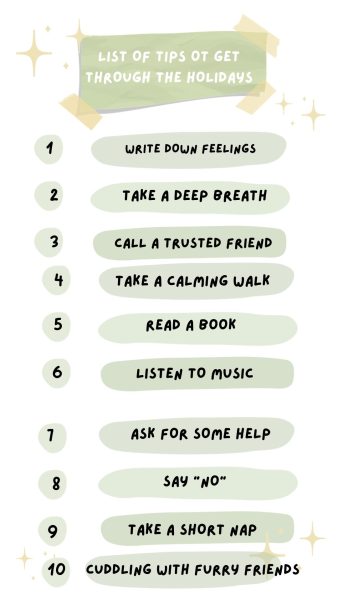The year’s final months bring a whirlwind of traveling and family gatherings for members to unite and celebrate the holidays. While Thanksgiving and Christmas come with beautiful memories and happy spirits, the chaos of holiday events may lead to mental and physical setbacks. The high energy of the holidays can easily tire anyone out; feeling stressed during these events comes naturally. Discovering coping mechanisms may help calm people down when their family becomes too demanding surrounding holiday events.
“The holidays are especially stressful for me because I have tons of family staying with me from out of town, so I feel like I have to hang out with them as much as I can. Sometimes, I over-plan myself and feel very overwhelmed with all the plans I made. I have found that making time for myself during the holidays really helps my mental health,” sophomore Lindsay Angel said.

Write down feelings
Taking the time to rationalize anxiety-ridden thoughts about a family event or holiday tradition can improve the experience of a family event. Writing or journaling about the day or certain concerns down allows the body to relax and let loose. Writing improves how the mind copes with events throughout the day and provides relaxation about certain worries.
Take a deep breath
Taking deep breaths helps the body relax and alleviate anxiety. In moments of overwhelming stress, taking a pause and practicing controlled breathing through the nose and out the mouth can enhance the body’s ability to handle the moment with ease. Copying a relaxed breathing pattern signals the nervous system to relax and calm down. The 4-7-8 breathing pattern also calms the body. It begins by breathing in for four seconds, holding the breath for seven and slowly breathing out for eight seconds.
Call a trusted friend
Calling a trusted friend can lighten the mood on the toughest and longest days. Phoning a friend to vent about one’s day or upcoming plans can divert the mind from other stressful situations to less overwhelming events and topics. Calling a friend provides a sense of reassurance and a short escape from the chaos of surrounding noise.
Take a calming walk
Stepping away from the family party and taking a walk may also relax the mind. Scenic walks or jogs can relieve built-up stress and allow the day to start off on a positive note. Putting on running shoes and jogging for a short amount of time empowers the body to release endorphins, which also improve the body’s mood and mindset throughout the day. Starting the habit of jogging or beginning a short walk in the morning permits a moment of alone time to start the day.
Read a book
Reading a book may help relieve anxiety since it takes the mind off current events and grants it to focus on its plot. Looking forward to starting a new book can provide the mind a break or focus on something else for a short amount of time. Reading lowers heart rate and allows one’s muscles to regain their composure. A book that could take the mind off of overpowering thoughts could include a stress management guide or a sweet romance.
Listen to music
Putting on music such as a favorite song can help ease the mind. Slipping away into an empty room with headphones and playing a comforting song or even calming music scientifically helps trigger certain neurochemicals that reduce stress naturally. At stressful points in the day, the body becomes tired and overwhelmed and needs a momentary break. Listening to a playlist or a couple of songs provides this sense of relaxation, therefore allowing the body to reset.
Ask for help
A loved one can provide an amazing resource to seek assistance from. Pulling aside a close family member or someone who understands those anxious thoughts to talk can help calm one’s emotions down; a simple hug or short conversation can also help. Releasing pent-up feelings with a loved one provides relief and can help release stress.
Say “no”
If an event or activity sounds like it will cause unwanted emotions that the body can not regulate, turning down the invitation to attend can allow alone time and less stress. Simply explaining the situation and explaining why the activity can cause stress will allow people to understand why one can not attend. Instead of attending, one can spend time with a calming and relaxing activity.
Take a nap
Taking a short nap can leave the body feeling restful and improve the mood. After a long day of hanging around a large crowd, the body feels overwhelmed and tired. Therefore, taking a nap can help reset those feelings. Feeling as if the day has reset helps the body handle overpowering emotions. Reducing fatigue can improve bodily functions such as processing situations and overcoming unwanted thoughts.
Cuddle with furry friends
Stealing the family animal and cuddling up can rid the body of stress and anxiety. Animals almost always find a way to heighten overall moods and calm the mind with funny tricks and their adorable faces. Next time, the family dog or cat seems in need of cuddles, take the opportunity to bask in their joy.
As people progress through the holiday season, preparing the mind before stressful weeks can help better the experiences and memories that come to life throughout holiday traditions. Thanksgiving and Christmas are meant to provide warmth and gratefulness, but unwarranted emotions can creep up on the mind. Heavier crowds trigger stimulating emotions which can lead to uncomfortable feelings. The Chant hopes this list of tips can improve mood and help the mind and body enjoy the moments people look toward all year.
“Large crowds are highly stimulating, as we process lots of information. We may begin to feel anxious as our threshold for stimulation is maxed out. Taking care of yourself/body and having time to unwind can help significantly,” NC Psychology teacher Samuel Fraundorf said.














